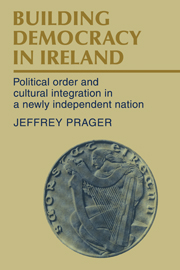 Building Democracy in Ireland
Building Democracy in Ireland Published online by Cambridge University Press: 25 October 2011
Introduction: the political context of crisis politics
The following three chapters will examine a major political crisis in the Free State during its first decade. As I will argue, these crises revealed the kinds of political obstacles – and how they changed over time – that the political leaders had to confront and overcome in their efforts to construct a modern, democratic order. Most broadly, these crises were political expressions of the competing cultural currents in Irish society. Especially in the early part of the decade, challenges to political order were understood and typically expressed through these cultural prisms. As I suggested in Chapter 3, these cultural strains became institutionalized through the constitutional drafting process. As I indicated, the result was paradoxical. Rather than solving the problem of contending cultural currents, the Constitution only amalgamated them into a single document. As the decade progressed, as the next chapters will detail, challenges to the political regime were less frequently expressed in broad cultural terms and increasingly in constitutional, even public policy, terms.
But I will argue that the shift in political language over the decade cannot be interpreted as the result of decreasing cultural opposition. Rather, different understandings of the Irish government continued to animate political life, but as the regime became increasingly adept at demonstrating its political control and authority, and as it appropriated greater political resources on its own behalf, political discourse became less general and confrontational.
To save this book to your Kindle, first ensure [email protected] is added to your Approved Personal Document E-mail List under your Personal Document Settings on the Manage Your Content and Devices page of your Amazon account. Then enter the ‘name’ part of your Kindle email address below. Find out more about saving to your Kindle.
Note you can select to save to either the @free.kindle.com or @kindle.com variations. ‘@free.kindle.com’ emails are free but can only be saved to your device when it is connected to wi-fi. ‘@kindle.com’ emails can be delivered even when you are not connected to wi-fi, but note that service fees apply.
Find out more about the Kindle Personal Document Service.
To save content items to your account, please confirm that you agree to abide by our usage policies. If this is the first time you use this feature, you will be asked to authorise Cambridge Core to connect with your account. Find out more about saving content to Dropbox.
To save content items to your account, please confirm that you agree to abide by our usage policies. If this is the first time you use this feature, you will be asked to authorise Cambridge Core to connect with your account. Find out more about saving content to Google Drive.